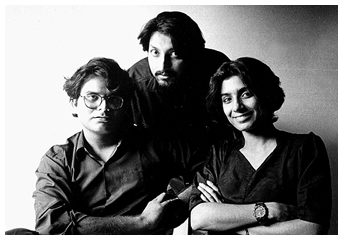


 |


launch interview with Jeebesh Bagchi, Monica Narula, and Shuddhabrata Sengupta
launch conversation with Raqs Media Collective and Steve Dietz
Raqs Media Collective was formed in 1991 by Jeebesh Bagchi, Monica Narula, and Shuddhabrata Sengupta as a way to pursue their interests in documentary filmmaking after completing graduate school in New Delhi. Over the ensuing decade, their practice has become increasingly hybridized, incorporating aspects of media history and research, criticism and curation, archives and databases, the building of open and public spaces for cultural practice, new media and digital art, still photography and graphic design, the Internet and cyberculture.
In 2001 Raqs cofounded, with Ravi Vasudevan and Ravi Sundaram, the Sarai New Media Initiative, a program of the Centre for the Study of Developing Societies at the University of New Delhi (www.sarai.net). The word sarai, or caravansarai, has its roots in Mughal India and refers to an enclosed space in a city or beside a highway--a destination and a point of departure--where travelers from all walks of life could find shelter, sustenance, and companionship. For Raqs, Sarai is a space where they have the freedom to pursue interdisciplinary and hybrid contexts for creative work and to develop a sustained engagement with the city and with different forms of media practice.
The Temporary Autonomous Sarai (TAS), Raqs' project for How Latitudes Become Forms, takes its cue from Hakim Bey's Temporary Autonomous Zone. TAS is both a physical space, resulting from a collaboration with the Japanese architectural practice Atelier Bow-Wow and University of Minnesota graduate students, and a departure point for visitors to explore cyberart in the parallel online exhibition Translocations, which presents the network-based art of artists from seven countries, including Raqs' own work OPUS (Open Platform for Unlimited Signification). OPUS is an open resource of images, sounds, and texts that can be sampled and reconstituted by anyone. It articulates a doctrine of rescension--Raqs' nonhierarchical theory of the copy--in which there is no derivative, and hence no master original, only new variations or, one might say, only local versions. OPUS is conceived as a digital "laboratory where cultures or artworks are grown," and the interface playfully maps genealogies of users' samplings. Underlying the project is a deeply political commitment to the power of open-source creativity and collaboration.
Installations by Raqs have been exhibited at Documenta 11, Kassel, Germany (2002), and included in the exhibitions Kingdom of Piracy at Ars Electronica, Linz, Austria (2002), and Emoção Art.ficial at Itaú Cultural, São Paulo, Brazil (2002).
--Steve Dietz











